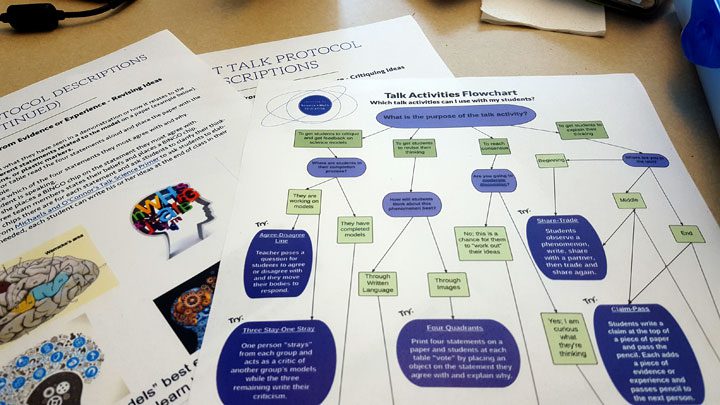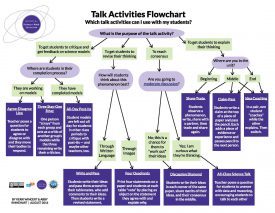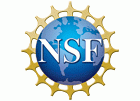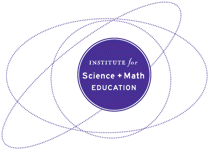How can I foster curiosity and learning in my classroom? Through talk!

Why It Matters To You
- Teachers should think carefully about discourse in their classrooms. Do students frequently talk about their thinking, or do they simply share “answers” to teacher questions?
- District Staff & PD Providers should support teachers in developing more strategies to support student sensemaking talk.
- School Leaders should consider their walkthrough protocols and measures of teacher growth. To what extent does instruction prioritize student sensemaking through talk? BY
What Is The Issue?
Learning happens through talking. And yet, student talk typically makes up less than 20% of the time spent in science class, and of that small amount of time, very little is focused on student sensemaking. However, specific instructional approaches—or ‘talk activities’—can be used to support students’ three-dimensional science learning. Our Talk Activities Flowchart, this tool highlights those talk formats and explains when, how, and why to use each talk format in support of student investigations.
Authors:
KERRI WINGERT - AUGUST 2016
Reflection Questions
- How often do students in your class or school get to talk deeply through their ideas?
- Are students truly listening to and responding to each other in conversation? Or are they simply trying to guess the right answer?
- Think about your students from non-dominant backgrounds. How do they engage in sensemaking? What activities might better support them?
Things to Consider
- In many classrooms, teacher talk takes up the majority of class time, and student talk is primarily used for correctly answering teacher questions. In this “guess what the teacher is thinking” approach, teachers know the answers to most of their own questions, and student talk is only used to verify they know the “right answer.”
- This classroom pedagogy style of teacher questioning/students answering has some merits, but it can marginalize students from non-dominant backgrounds who have less experience with this kind of adult-moderated instruction with a known answer.
- Alternatively, many studies have shown that student talk is a very productive class activity and that it results in deep sensemaking for many kinds of students. One key to building more student-focused pedagogy is developing an authentic curiosity about student thinking. Studies have shown that students learn and respond in very lively, scientific ways when asked open-ended questions, given agency for their learning, and use scientific criteria for knowledge claims.

Pictured Above: Student Talk Flow Chart
Attending to Equity
- All students should routinely engage in sensemaking talk to support their learning. The lower stress of peer-to-peer conversation supports linguistic risk-taking and this makes it especially fruitful for students who are language learners.
Recommended Actions You Can Take
There are easy ways to support student thinking through talk:
- Student-to-student talk has distinct advantages over whole-class discussion, especially for English language learners. When students talk to each other to share their thinking, they are more likely to: (1) connect to their personal and cultural sources of knowledge, (2) take risks with new language, and (3) use community-based linguistic practices to support their science learning.
- Our Student Talk Flowchart can help you plan activities so that students’ talk is more equitable, scientific, and focused on sensemaking.
- Each ‘talk activity’ links off to additional info on how to use it for specific purposes: (1) to get students to explain their thinking, (2) to get students to critique and get feedback on their models, (3) to get students to revise their thinking, and (4) to reach consensus.
- Teacher-student talk: Use the ideas in the Talk Science Primer and the Science Discourse Primer to guide your whole-class discussion. They support a classroom culture focused on curiosity and learning.
- Download our student-facing PowerPoint to introduce these activities to your class.
ALSO SEE STEM TEACHING TOOLS
STEM Teaching Tools content copyright 2014-22 UW Institute for Science + Math Education. All rights reserved.
This site is primarily funded by the National Science Foundation (NSF) through Award #1920249 (previously through Awards #1238253 and #1854059). Opinions expressed are not those of any funding agency.
Work is licensed under a Creative Commons Attribution-ShareAlike 4.0 Unported License. Others may adapt with attribution. Funded by the National Science Foundation (NSF). Opinions expressed are not those of any funding agency.


 Email Feedback
Email Feedback


